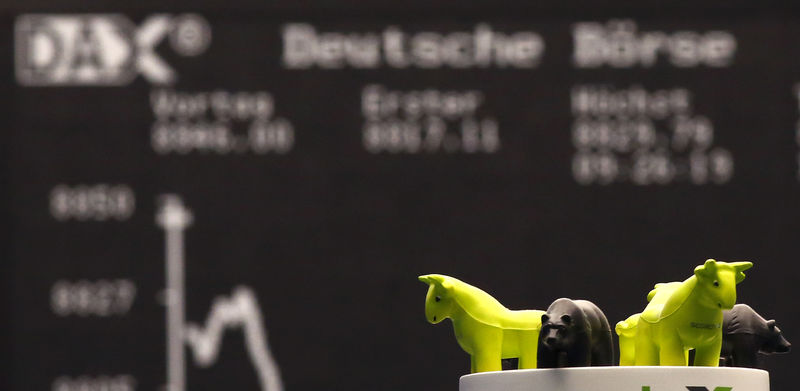By Peter Nurse
Investing.com - European stock markets are seen opening firmly lower Friday, continuing the global selloff after a sharp rise in bond yields weighed on sentiment.
At 2:10 AM ET (0710 GMT), the DAX futures contract in Germany traded 0.7% lower, CAC 40 futures in France dropped 1.6% and the FTSE 100 futures contract in the U.K. fell 1.4%.
The global weakness started on Wall Street overnight, as the tech-heavy Nasdaq suffered its worst day in nearly four months. The Nasdaq Composite fell 3.5%, as a sharp spike in U.S. government bond yields on inflation fears sounded a warning for riskier assets that have benefited from the Covid-induced ultra-easy monetary policies.
This selloff continued in Asia, with Japan’s Nikkei ending almost 4% lower and Hong Kong’s Hang Seng dropping over 3%, and is set to push into Europe as the week draws to an end.
Overnight, the yield on the benchmark 10-year U.S. Treasury note briefly crossed the 1.6% level to trade at its highest level in more than a year. This is hitting investor appetite for the more richly valued areas of equity markets, and growth stocks in particular. Higher long-term rates raise the opportunity cost of holding assets that are only expected to generate free cash flow in the future.
Turning to the European corporate sector, Deutsche Telekom (OTC:DTEGY) is likely to be in the spotlight after the German telecommunications giant reported a sharp rise in net profit and soaring revenue in its fourth quarter. BASF, one of the world's largest chemicals companies, also reported better-than-expected figures and sounded an optimistic note about the outlook this year for its biggest customer, the auto industry.
Elsewhere, Spanish infrastructure company Ferrovial (MC:FER) announced a 25 million euro share buyback.
German January import prices surprised on the upside earlier Friday, and the focus will turn to French and Spanish consumer prices later in the session. The European Central Bank has said it expects to look through any short-term increase in CPI, given the underlying problems still facing the Eurozone economy.
Oil prices fell sharply Friday,as rising U.S. Treasury yields supported the greenback, making U.S.-dollar priced oil more expensive.
Despite this drop, both Brent and WTI are up strongly this week, with gains of around 3.8% and 5.9%, respectively, up about 20% this month.
The Organization of the Petroleum Exporting Countries and their allies including Russia, a group known as OPEC+, is due to meet next week. Concerns are growing that this rise in prices will tempt the producers to add supply to the market.
U.S. crude futures traded 1.2% lower at $62.77 a barrel, while the international benchmark Brent contract fell 1.2% to $65.31.
Elsewhere, gold futures fell 1% to $1,757.40/oz, while EUR/USD traded 0.3% lower at 1.2138.
